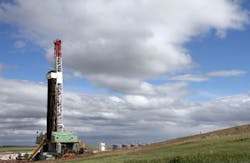Limited risk of radiation exposure associated with oil and gas development, study finds
There is little risk of radiation exposure from shale gas development in Pennsylvania, according to a study by the state Department of Environmental Protection (DEP).
The multi-year study examined radioactivity levels in flowback waters, treatment solids and drill cuttings, as well as transportation, storage and disposal of drilling wastes, to assess the potential for harm to workers or the public from radiation exposure due to oil and gas development. The research also included a study of radon levels in natural gas.
Although the report makes recommendations for further study, it concludes that:
- The use of natural gas extracted from geologic formations in Pennsylvania poses little risk for additional radon exposure to the public.
- There is little or limited potential for radiation exposure to the public and workers from the development, completion, production, transmission, processing, storage and end use of natural gas. But the DEP highlighted potential radiological environmental impacts from fluids if spilled, and said that radium should be added to the Pennsylvania spill protocol.
- At facilities that treat oil and gas wastes, and at landfills receiving waste from the oil and gas industry, there is little potential for radiation exposure to workers and the public. However, filter cake from facilities treating wastes could have a radiological environmental impact if spilled, and there is also a potential long-term disposal issue, the DEP noted.
With regard to the practice of spreading salty drilling wastewater from conventional natural gas wells on roads to suppress dust, the DEP said that it found limited potential for radiation exposure to road users. But it called for further research into the radiological environmental impacts.
"The study report is the culmination of a multi-year effort and represents what we believe to be the most comprehensive radiological study of the oil and gas industry ever conducted," commented Vince Brisini, DEP deputy secretary for Waste, Air, Radiation and Remediation. "While the recommendations for future actions contained in the report call for additional studies and efforts, we now have data to inform the management of natural gas resources and resultant wastes for environmental and health protection."
The research was launched in January 2013 at the direction of Gov. Tom Corbett.
